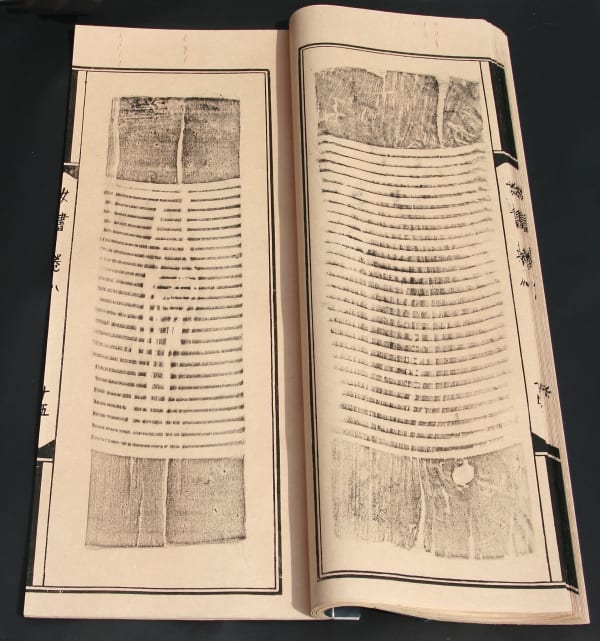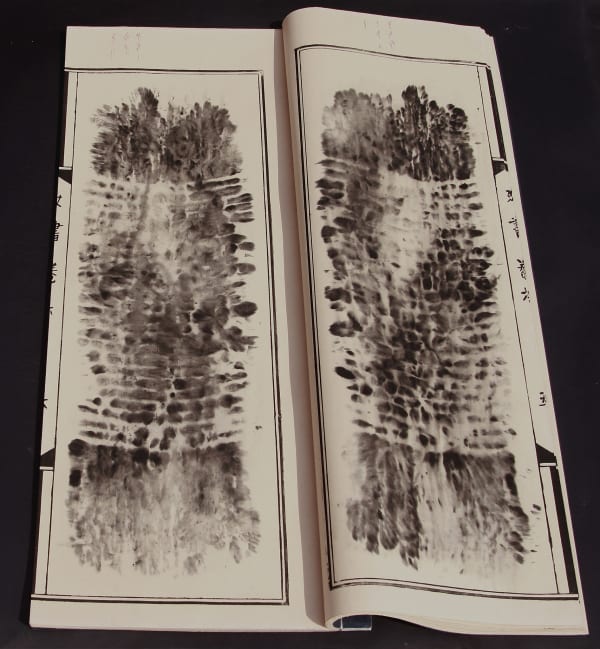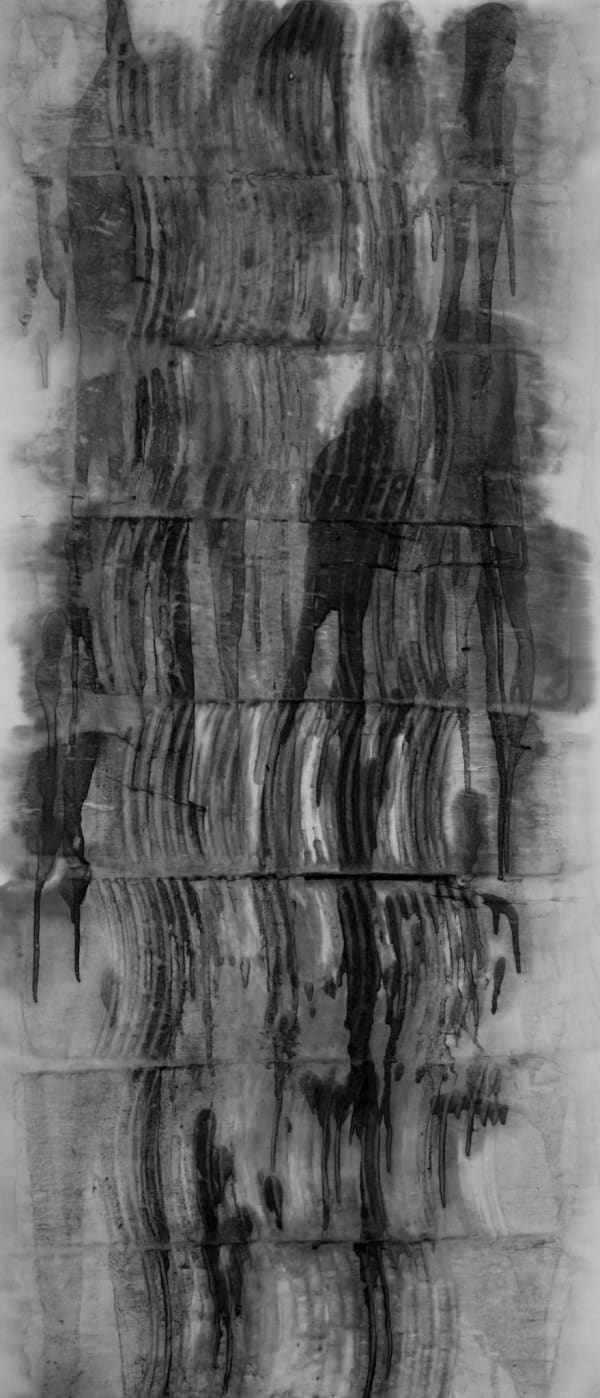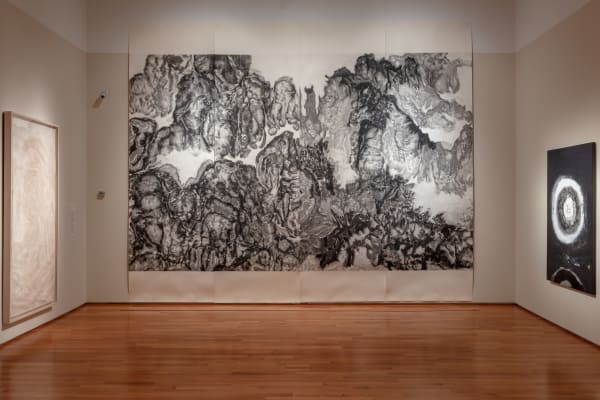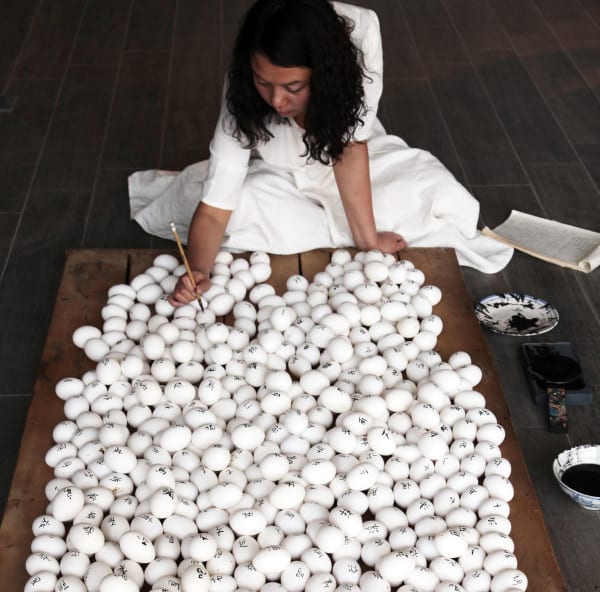b. 1974 in Hunan, lives and works in Beijing
A Hunan native who maintains an emotional distance towards her adopted home of Beijing, Tao Aimin approaches the lives of rural Chinese women with a combination of empathy and anthropological curiosity. With eloquent inarticulacy, she gives voice to their unexpressed and undocumented experiences, which are increasingly at risk of being forgotten. Incorporating found objects, painting, calligraphy, printmaking, video, and installation, her works move fluently between elite and popular culture and between the languages of traditional and contemporary art. They are bold and sensitive meditations on the issues of artistic authorship and self-representation, labor, embodied knowledge, and collective memory.
Since 2005, Tao Aimin has created a series of works from wooden washboards that she has collected in the hundreds on repeated visits to the countryside. They have been fractured and deformed by repeated and prolonged exposure to the elements. Once household necessities, they have been now largely supplanted with modern technology, a fate shared by the culture of the women who used them. For the artist, these washboards are the only material evidence of the women’s toil: “I am concerned with the circumstances of women in different eras. Washboards—these ‘artifacts’ submerged for years in water—are symbols of the women of a different time, a river of life witnessed by countless women in history.”
These washboards form the installation Women’s River (2005), a multivalent metaphor for resilience, continuity, and transience. Many of the women who owned the washboards are illiterate and possess no visual records of themselves. Tao Aimin paints their portraits on the washboards, which are in a sense their only self-portraits. In Women’s Book (2005), she collects washboards into albums, turning them into wordless storybooks and their physical fractures into the signs of an inarticulate language. In Washed Relics (2006, 2014), she strings the washboards together with fishing lines into wall-size suspended displays that recall archaeological relics and anthropological specimens in museums. Constituted by mundane and personal objects of anonymous women, these installations are counterpoints to the monumental and universalizing estrangements of language and culture by contemporary male artists, most notably Xu Bing’s Book from the Sky series.
More recently, Tao Aimin has used washboards not directly as found objects, but rather as printing blocks to create rubbing impressions on xuan paper. She thus engages the traditions of calligraphy, woodblock prints, and epigraphic studies. In Women’s Book (2005), she collects such rubbings into classical string-bound volumes and inscribes them in Nüshu, a syllabic script invented by women of Jiangyong County in Hunan to transcribe their local dialect. With these counterfactual artifacts, Tao Aimin posits an alternative literate tradition—unfamiliar to us not because it is fictive or imaginary, but because it has been suppressed and confined to the margins.
Tao Aimin graduated from the Fine Arts Department of National Huaqiao University, Fujian in 1999 and an Assistant Lecturer training course in the Mural Painting Department of the Central Academy of Fine Arts in 2001. She has previously exhibited in World Art Museum of China Millennium Monument (2005, 2006, 2011), National Art Museum of China (2009), Today Art Museum (2008, 2010), Sakshi Gallery (2009), and Ink Studio (2014). She has received a Newcomer Award 2006 Chinese Contemporary Art Document Exhibition, a nomination for the Xiao Shufen Award from the Wu Zuoren International Art Foundation, and a nomination as Art China Artist of the Year in the Installation and Multimedia category (2009). Her works can be found in the collections of Yanhuang Art Museum and Chengdu Modern Art Museum, among others.
-
 Nv Shu: Brother and Sister Series - I Was Flying 女书 · 姐弟系列之我飞起来了, 2019
Nv Shu: Brother and Sister Series - I Was Flying 女书 · 姐弟系列之我飞起来了, 2019 -
 Nv Shu: Sisterhood Series - The Cruel Trick 女书 · 姐妹系列之恶作剧, 2019
Nv Shu: Sisterhood Series - The Cruel Trick 女书 · 姐妹系列之恶作剧, 2019 -
 In a Twinkle No. 6 一指间系列之六, 2011
In a Twinkle No. 6 一指间系列之六, 2011 -
 The Secret Language of Women No. 8 女书 第八卷, 2008
The Secret Language of Women No. 8 女书 第八卷, 2008 -
 The Secret Language of Women No. 6 女书 第六卷, 2008
The Secret Language of Women No. 6 女书 第六卷, 2008 -
 The Secret Language of Women No. 4 女书 第四卷, 2008
The Secret Language of Women No. 4 女书 第四卷, 2008 -
 Woman's Journal No. 2 女书.手记之二, 2009
Woman's Journal No. 2 女书.手记之二, 2009 -
 Language of Water No. 14 水语系列14, 2007
Language of Water No. 14 水语系列14, 2007 -
 Language of Water No. 4 水语系列4, 2007
Language of Water No. 4 水语系列4, 2007 -
 In a Twinkle No. 3 一指间系列之三, 2011
In a Twinkle No. 3 一指间系列之三, 2011 -
 High Mountains and Flowing Water, Installation 高山流水,装置, 2007
High Mountains and Flowing Water, Installation 高山流水,装置, 2007 -
 Untitled I 无题一, 2015
Untitled I 无题一, 2015 -
 Washed Relics No. 2, Installation 出水文物之二,装置, 2014
Washed Relics No. 2, Installation 出水文物之二,装置, 2014 -
 The Secret Language of Women 女书, 2008
The Secret Language of Women 女书, 2008
-

Undersong: Secrets, Dreams, Truths and Power
Chen Haiyan & Tao Aimin 22 Jun - 1 Sep 2019INK Studio is proud to present Undersong: Secrets, Dreams, Truths, and Power, a two-person solo exhibition of artworks by Chen Haiyan (1955 –) and Tao Aimin (1974 –), which explore the power that is constituted by ordinary women when they share their intimate stories, secrets, truths, and dreams.Read more -

INK AND THE BODY
Ink and Phenomenology, Exhibition No. 1 21 Sep - 15 Nov 2014Ink Studio’s premier group show, Ink and the Body , launches a planned series of three exhibitions examining ink painting in terms of the relationship between the subject and both...Read more
-

Exhibition | Tao Aimin at "The Book as Artistic Medium", ASE Foundation
May 10, 2025The Book as Artistic Medium Curator: Biljana Ciric Dates: 2025.4.24 -10.10 Address: ASE·Space & Art Library This exhibition is the outcome of a long-term research...Read more -
Exhibition | Summoning Memories: Art Beyond Chinese Traditions, Asia Society Texas Center
Bingyi, Jennifer MA Wen, Liu Dan, Tao Aimin, Wang Tiande, Xu Bing, Zheng Chongbin May 10, 2023Summoning Memories: Art Beyond Chinese Traditions Date: 10 February - 2 July 2023 Venue: Asia Society Texas Center, Houston, Texas, US Curated by Susan L....Read more -
Exhibition|Her Secret Code: Tao Aimin and Nüshu
April 19, 2023Her Secret Code: Tao Aimin and N üshu Curator: Dr. Luise Guest 3.30-5.4, 2023 5/16 Hickson Rd, Walsh Bay NSW 2000, Sydney In this time...Read more -
Exhibition | Tao Aimin at "Stepping Out!", Lillehammer Art Museum
October 30, 2022Stepping Out! 13th of May–16th of October 2022 Lillehammer Art Museum Tao Aimin's installation artwork Women’s River II is presented at Lillehammer Art Museum. The...Read more -

Art Fair | He Yunchang, Tao Aimin, and Yang Jiechang at Art021
November 19, 2015At Art021 2015 in Shanghai, INK studio will present works by three highly experimental artists: He Yunchang, Tao Aimin, and Yang Jiechang. Each of them...Read more -

EXHIBITION | TAO AIMIN IN "NATURALLY WOMEN," EXPO MILANO 2015
April 29, 2015Tao Aimin will participate in “Naturally Women,” an exhibition of works by five contemporary Chinese artists to take place in October 2015 at the KIP...Read more




